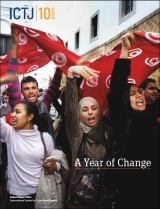ICTJ recently released its 2011 annual report, covering the period from September 2010 through August 2011. Our tenth anniversary year, it has also been a period of transition for ICTJ and for transitional justice, as we responded to new opportunities in North Africa and the Middle East, and refocused on our future by embarking on a new strategic planning process. Read about the work of our thematic and regional programs and some of our major accomplishments.
2011 Annual Report (PDF)
Letter from the President
It has been a year of renewal, for ICTJ as well as for many places in the world. Midway through the period covered by this report, protests against state repression swept across North Africa and the Middle East, Raising hopes for a flourishing of human rights but also fears of further bloodshed and repression. It is no easier today to predict the ultimate outcome of the Arab Spring, but we continue to lend our support and expertise to those who continue, courageously, to demand accountability for the abuses they have suffered.
As the Arab Spring shows once again, the defense of human rights is at its heart a national process, guided by domestic movements and by state institutions that are responsive to their demands. Thus, while the hurdles are formidable, an increasing number of national governments are exploring ways to investigate and hold accountable those who have committed serious crimes, rather than relying on courts of last resort, such as the ICC. The challenge for the international community is to make sure that such domestic tribunals have the expertise and the resources necessary to ensure that such trials are fair and effective.
At the level of international policy, this year saw a groundbreaking recognition of the links between development, security, and justice, in the World Bank’s World Development Report. This report, to which ICTJ made significant contributions, recognized these linkages and identified transitional justice as a core tool in establishing the conditions for development in societies emerging from authoritarianism and war.
ICTJ has been actively engaged on all these issues. We sent our first mission to Tunisia in early February, and have developed robust Tunisia, Egypt, and regional Middle East/North Africa initiatives to build on the political openings in these countries, in order to ensure that accountability and redress form a key element in the reconstruction of those societies. In Colombia, we are providing high level technical assistance in re-crafting mechanisms to address complex issues of peace and justice, the rights of victims, and land reforms. We continue to support efforts to address gender violations and the rights of children in a variety of contexts, from Nepal to DRC and beyond.
These efforts and others described in this report are only a sample of ICTJ’s work to promote transitional justice from the period between September 2010 and August 2011. They represent the ways in which ICTJ, too, has grown, responding to a changing world with strategic investments in new programs and a stronger infrastructure.
After a decade of work, ICTJ remains at the vital center of an evolving field. Our broad knowledge of how transitional justice works on the ground has helped us drive changes in our field; and, as the field changes, so must we. As I look forward to a new decade for ICTJ, I am aware of the need to question our assumptions, reexamine our mode of operations, and take the steps necessary to maintain our leadership in the years to come. We are using our 10th anniversary to reflect on ICTJ and the field we strive to build, and to plan for our future. I look forward to reporting on our first steps in our second decade in the coming year.
With warmest regards,
David Tolbert
